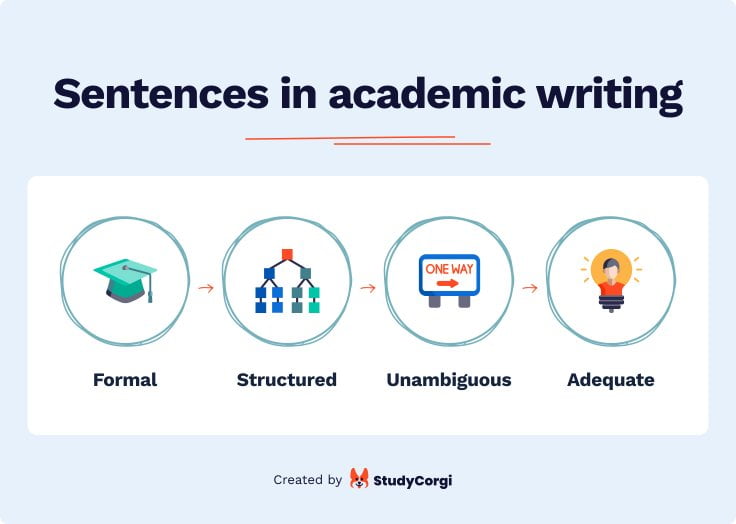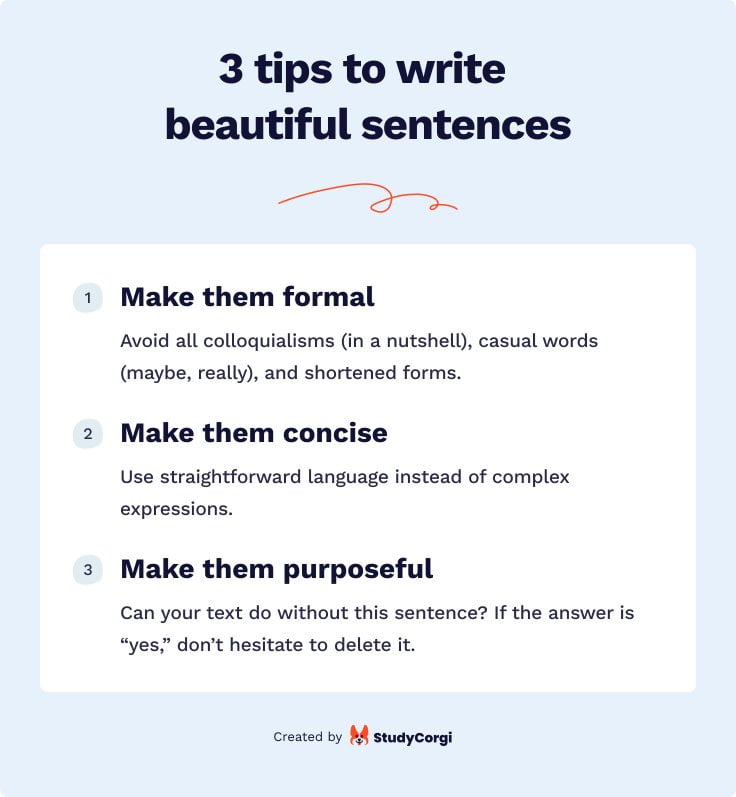👍 Sentence Rewriter: 4 Benefits
Here are the key benefits of this sentence rewriter.
| 🎓 Made for students | Developed specifically for educational purposes. |
|---|---|
| ❌ No plagiarism | Rewrites sentences to help you avoid plagiarism. |
| ✨ Very easy | Rewords a sentence or paragraph in a couple of clicks. |
| 🎯 Customizable | Allows you to set the share of paraphrased words. |
In other words:
- This sentence rewriter has been designed to help students. Most free online sentence rephrasers are multi-purpose. Their style is unpredictable and often far from academic. We have calibrated our instrument for educational purposes only.
- It is a powerful anti-plagiarism tool. Zero plagiarism is the foremost requirement for all academic papers. When you take an idea from another text, you should make sure it is uniquely worded. This sentence changer eliminates the problem.
- The paraphraser is as simple as possible. Copy the sentence, paste it into the blank field and press the “Rephrase” button. For a better result, read the next point.
- It is customizable. You can adjust the sentence changer rate in increments of 20%. You can also process words with capital letters as common nouns.
🖋️ Sentences in Academic Writing
Academic writing is not about narrowly specialized terms and lengthy explanations. Its purpose is to communicate complicated things in the most understandable manner. Thus, sentences in academic writing should be as follows.

- Formal: Few people know why this standard requirement is so critical. The thing is that readers may understand and interpret informal texts differently.
- Structured: Academic writing often expresses complex ideas. Structure makes it easier to follow the author’s thoughts.
- Unambiguous: Similar to legal texts, academic writing should allow only one possible variant of interpretation to prevent its ideas from being challenged.
- Adequate: This trait raises the efficiency of your communication with the readers.
How to Write Beautiful Sentences: 3 Tips
Below you’ll find 3 tips that will help you to write perfect sentences that will comprise your academic paper.

Make Your Sentences Formal
Avoid all colloquialisms (in a nutshell), casual words (maybe, really), and shortened forms. But remember that formal does not mean pompous. Besides, disciplined use of grammar and punctuation is also critical.
In particular, check if all your sentences are complete, the colons and semicolons are in their place, and verbs agree with nouns.
Make Your Sentences Concise
We recommend you always use straightforward language instead of complex expressions. High-flown language may sound academic for inexperienced researchers, but your readers will rather appreciate a succinct and informative style.
Try to make precise sentences without any possibility for double interpretation.
The fewer words you use to convey the same idea, the better.
Make Your Sentences Purposeful
Why did you write this sentence? Can your text do without it? If the first question has no definite answer and the second one is “yes,” don’t hesitate to delete the sentence.
Decide which purpose you want to convey.
If it is a question, be sure to answer it. Finally, be objective in your expressions. Avoid first (and when possible, second) person. That’s why there is so much passive voice in academic writing.
📑 How to Rewrite Sentences Step by Step
Sometimes your sentences are not good. You could delete them, but we have a better solution. Check it out below.
How to Rewrite Monotonous Sentences
Word Choice & Subject
Many writers overuse several words or subjects. This practice weakens their writing because improper repetitions irritate the reader and look unprofessional. Note how you open your sentences and make sure there is subject variety.
For example, analyze the subjects in the following paragraph:
| ❌ | Corgis are known for their friendly nature. These small house dogs are loyal and loving pets. Corgis are also known for their enthusiasm for working. Many Corgis excel in dog sports, such as herding, agility, obedience, etc. |
As you can see, the subject in these four sentences is unnecessarily repeated. Consider a better variant:
| ✅ | Corgis are known for their friendly nature. These small house dogs are loyal and loving pets. They are also known for their enthusiasm for working. Many representatives of the breed excel in dog sports, such as herding, agility, obedience, etc. |
Varying Sentence Type
Repetitive type of sentences hinders your reader’s engagement with the text. You can check your writing for this drawback if you know the sentence types:
- Simple (with no dependent clause or conjunction);
- Compound-complex (with more than one independent and one or more dependent clause);
- Compound (with conjunctions “but,” “and,” “e.g.,” “yet,” etc.)
- Complex (with a dependent clause).
Here is a brief but illuminating example where each sentence starts with an adverbial modifier of place. All of them are simple.
| ❌ | In 2013, Corgis were endangered. In Britain, only 231 dogs were registered. In Britain, the number of dogs should be at least 300. |
We have slightly corrected the type of the third sentence and moved the place modifier in the second one. Look how better it sounds now.
| ✅ | In 2013, Corgis were endangered. There were only 231 dogs registered in Britain. This country requires to have at least 300 specimens of a dog breed so that it is not considered endangered. |
How to Reword Sentences to Change Their Length
Do you know that the optimal sentence length is 15 to 20 words? Anything more than that appears wordy and ponderous. But it does not mean you should always write your sentences with the same word count. Like in our last piece of advice, it is always better to vary sentence length to avoid monotonous passages. Below you will find an example with only short sentences and another one with only long structures.
| ❌ | Corgis are good runners. They can run very fast. A healthy adult Corgi can reach almost 23 mph. |
The passage sounds dull. All the sentences are short and simple. Let us add some conjunctions and dependent clauses to increase the word count. Besides, note that we have added no new information.
| ✅ | Corgis are good runners. They can run faster than you may have thought. Corgi owners confirm that on level ground, a healthy adult Corgi can reach almost 23 mph. |
On the other hand, several lengthy and complex sentences in a row won’t let your reader identify the purpose of the paragraph.
| ❌ | The conservation status of Corgis became an issue of concern since their population has been on a decline since the beginning of the 2000-s (24 words). In 2013, there were only 231 dogs registered in the UK, and in 2014, slightly more got registered, 274, in particular, and they gained the “vulnerable native breed” status as claimed by the British Kennel Club (36 words). |
We have deleted the needless words and divided the sentences into shorter and simpler passages. Compare the differences:
| ✅ | The conservation status of Corgis became an issue since their population declined at the beginning of the 2000-s (18 words). In 2013, only 231 dogs got registered in the UK, and in 2014, their number grew to 274 (18 words). They gained the “vulnerable native breed” status as claimed by the British Kennel Club (14 words). |
How to Rewrite Sentences from Passive to Active Voice & Vice Versa
A sentence is considered formulated in the passive voice if the subject becomes the object of an action. In the active voice, the subject is the acting entity.
A century ago, the passive voice inundated academic writing. But in recent years, most writing guides recommend using the active voice as much as possible for its clarity. The general opinion of scholars is that the passive voice is an attempt to evade the author’s responsibilities (compare “We consider...” and “It is considered...”).
In any case, both grammatical forms are correct if properly balanced. How could you do that? In academic writing, use the active voice to describe actions. You could use the passive voice to describe the study results, methodology, and other objective processes. Besides, we recommend transforming all sentences with the word “by” into the active voice. Your writing will sparkle!
| ❌ | A dog’s quality of life is highly impacted by the proper functioning eyesight (unnecessary use of passive voice). Unfortunately, there are many eye conditions inherited or developed by Corgis (mind the adverb “by”). Some may cause blindness if a vet doesn’t treat them immediately (the active voice here sounds weird, and the subject “vet” can easily be omitted). |
Compare the above paragraph with our version:
| ✅ | The proper functioning eyesight highly impacts a dog’s quality of life. Unfortunately, Corgis can inherit or develop many eye conditions. Some may cause blindness if not treated immediately. |
Compare the above paragraph with our version:
How to Rewrite Sentence Fragments & Run-off Sentences
Sentence Fragments
It is a phrase that does not have enough members to form a complete sentence. For example, there is no subject or verb. You can easily miss a necessary component in a long and complex sentence. Here is a brief example with our further corrections:
| ❌ | A legend says that used Corgis to pull carriages on battlefields. |
| ✅ | A legend says that fairies used Corgis to pull carriages on battlefields. |
Run-off Sentences
A run-off sentence happens when several independent clauses (or complete sentences) are incorrectly connected within one sentence. The most common mistake is to put a comma between them. This error is called comma splice:
| ❌ | Training Corgis could be challenging as they are intelligent and stubborn, early training is recommended. |
There are four possible ways to correct this sentence:
- Use coordinating conjunction
| ✅ | Training Corgis could be challenging as they are intelligent and stubborn, and early training is recommended. |
- Use subordinating conjunction
| ✅ | Early training is recommended because training Corgis could be challenging as they are intelligent and stubborn. |
- Use a semicolon
| ✅ | Training Corgis could be challenging as they are intelligent and stubborn; early training is recommended. |
- Use a period
| ✅ | Training Corgis could be challenging as they are intelligent and stubborn. Early training is recommended. |
Thank you for reading this article! If you are not completely satisfied with the result of paraphrasing, try one of our highly specialized tools for various types of content:
- Essay rephraser
- Paragraph rewriter
- Sentence rewriter
- Phrase rewriter
- Paper rewriter
- Thesis rephraser
- Text reworder
- Poem paraphraser
- Essay reworder
❓ Sentence Rewriter FAQ
How Does a Sentence Rewriter Work?
This online paraphrasing tool uses contextual synonyms and artificial intelligence to create the best meaningful variation of a sentence you inserted in the system. The result is usually shorter, has another tone, or has a different readability level. Most sentence rewriter tools suggest rewording variants you can choose from.
What Is the Best Way to Rewrite the Sentence to Avoid Repetition?
Most people are used to writing in a limited set of words. That’s why repetitions are inevitable. Moreover, traditional synonym substitution may not suffice to make a sentence original. The best solution is to ask someone else to change your phrase or use a sentence rewriter. If neither of these options is practicable, do your best to alter the sentence structure and point of view.
How to Rewrite a Sentence in Active Voice?
Place the object of the action after the verb. If there was no actor in the passive sentence, you need to add one. Start the sentence with the actor and modify the verb form as necessary. It is a powerful sentence rewriting tool that allows one to obtain a non-plagiarized phrase without changing many words.